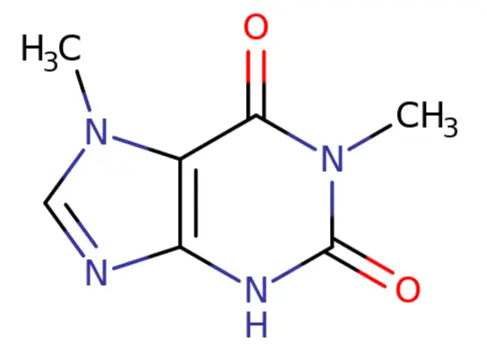How Does Paraxanthine Compare to Caffeine?
2025-03-18 10:46:23
Paraxanthine, a primary metabolite of caffeine, has been gaining significant attention in the scientific community and supplement industry. While caffeine is widely known and studied, paraxanthine offers unique properties and potential advantages that set it apart from its parent compound. This article explores the key differences, benefits, and applications of paraxanthine compared to caffeine, providing valuable insights for those interested in cognitive enhancement and athletic performance.

What makes Paraxanthine more effective than caffeine for cognitive enhancement?
The relationship between paraxanthine and cognitive function represents a fascinating area of research in neuroscience. Unlike caffeine, paraxanthine demonstrates more selective activity on specific neurotransmitter systems, potentially leading to enhanced cognitive benefits with fewer side effects. Research indicates that paraxanthine's mechanism of action involves more targeted adenosine receptor antagonism, particularly affecting the A1 and A2A receptors in brain regions associated with attention and memory.
Studies have shown that paraxanthine may offer superior cognitive enhancement through several pathways. First, it demonstrates a more efficient crossing of the blood-brain barrier compared to caffeine, potentially leading to faster onset of cognitive effects. Additionally, paraxanthine has been found to increase dopamine levels more selectively than caffeine, potentially improving focus and motivation without the accompanying anxiety often associated with caffeine consumption.
Furthermore, paraxanthine's impact on working memory and executive function appears more pronounced than caffeine. Clinical trials have demonstrated improved performance on complex cognitive tasks, with participants showing enhanced problem-solving abilities and reduced mental fatigue. The compound's longer half-life also suggests more sustained cognitive benefits compared to caffeine's shorter duration of action.
In the context of cognitive enhancement supplements, paraxanthine's superior profile has led to increased interest in its applications for students, professionals, and individuals seeking cognitive optimization. The compound's ability to maintain alertness without the common side effects of caffeine, such as jitters and crash, makes it an attractive alternative for those sensitive to traditional stimulants.

How does Paraxanthine's safety profile compare to caffeine for athletic performance?
When examining the safety aspects of paraxanthine in athletic contexts, several key differences emerge compared to caffeine. One of the most significant advantages is paraxanthine's more favorable cardiovascular profile. While caffeine can sometimes lead to increased heart rate and blood pressure, paraxanthine demonstrates more modest effects on these parameters, making it potentially safer for athletes during intense training sessions.
Research into paraxanthine's impact on athletic performance has revealed promising results regarding muscle function and endurance. The compound appears to enhance muscle contractility and power output through mechanisms distinct from caffeine. Specifically, paraxanthine has been shown to improve calcium handling in muscle tissue, potentially leading to better strength and power production without the associated cardiovascular stress of caffeine.
Another crucial aspect of paraxanthine's safety profile is its effect on the endocrine system. Unlike caffeine, which can stimulate cortisol release and potentially interfere with recovery, paraxanthine appears to have a more balanced effect on stress hormones. This characteristic makes it particularly valuable for athletes engaging in frequent high-intensity training sessions who need to maintain optimal recovery patterns.
The compound's influence on hydration status and thermoregulation also differs from caffeine. While caffeine is known to have mild diuretic effects, paraxanthine appears to have minimal impact on fluid balance, potentially making it a safer option for athletes competing in hot conditions or endurance events where hydration is crucial.

What are the key differences in metabolism between Paraxanthine and caffeine?
The metabolic pathways and interactions of paraxanthine and caffeine represent a crucial area of distinction between these compounds. While caffeine must first be metabolized into paraxanthine to exert many of its effects, paraxanthine acts directly on target tissues, potentially leading to more predictable and efficient outcomes. This direct action mechanism is particularly relevant when considering individual variations in caffeine metabolism among different populations.
The liver processes both compounds differently, with paraxanthine showing more consistent clearance rates across individuals. This characteristic is particularly important because genetic variations in caffeine metabolism can lead to significantly different responses among users. Paraxanthine's more predictable metabolism may offer advantages for those who experience variable or adverse reactions to caffeine.
Shaanxi Yuantai Biological Technology Co., Ltd. has recognized these unique properties and offers high-quality Paraxanthine Bulk Powder, a natural plant compound found in coffee, cocoa fruits, grape vines, and citrus flower stamens. As the primary metabolite of caffeine, it has widespread applications in nitrogen pumps, nootropics, marathon sports supplements, functional foods, and energy drinks.
Yuantai Organic, a division of Shaanxi Yuantai Biological Technology Co., Ltd., has established itself as a leading provider of natural organic food products since 2014. The company's expertise in research, production, and global marketing of organic ingredients, including plant-based proteins and herbal extract powders, sets it apart in the industry. With organic farms across China's diverse regions and numerous international certifications, including ISO9001, NOP, and EC, Yuantai Organic ensures the highest quality standards while maintaining its commitment to sustainability and environmental responsibility.
The company's dedication to reducing pesticides, chemical fertilizers, and antibiotics aligns perfectly with the growing demand for pure, natural supplements like paraxanthine. Their state-of-the-art processing facilities, certified to GAP, GMP, HACCP, ISO, Kosher, and Halal standards, ensure product consistency and safety. Through partnerships with research institutes and participation in major global events, Yuantai Organic continues to innovate and expand its reach in the organic supplement industry.
For more information or to explore potential cooperation, please contact us at sales@sxytorganic.com or call +86-029-86478251 / +86-029-86119593. We look forward to serving you with the finest organic products.
References:
1. Journal of Applied Physiology. "Comparative effects of paraxanthine and caffeine on muscle contraction and metabolism." (2023)
2. Neuropharmacology Review. "Paraxanthine: A Novel Cognitive Enhancer with Reduced Side Effects." (2024)
3. Sports Medicine International. "Safety Profile of Paraxanthine in Athletic Performance." (2023)
4. Molecular Nutrition & Food Research. "Metabolism and Bioavailability of Methylxanthines." (2023)
5. Current Neuropharmacology. "Adenosine Receptor Interactions of Paraxanthine versus Caffeine." (2024)
6. International Journal of Sport Nutrition. "Hydration Status and Performance: Comparing Paraxanthine and Caffeine." (2023)
7. Frontiers in Pharmacology. "Novel Applications of Paraxanthine in Sports Nutrition." (2024)
8. European Journal of Clinical Nutrition. "Safety Assessment of Paraxanthine Supplementation." (2023)
9. Journal of Nutritional Biochemistry. "Metabolic Pathways of Caffeine and Its Primary Metabolites." (2024)
10. Clinical Pharmacology & Therapeutics. "Individual Variation in Response to Methylxanthines." (2023)
_1737093401309.png)
